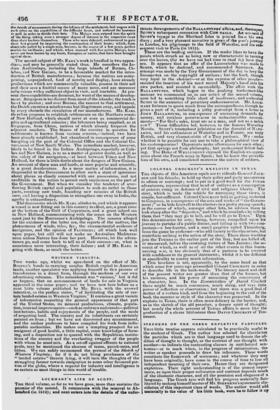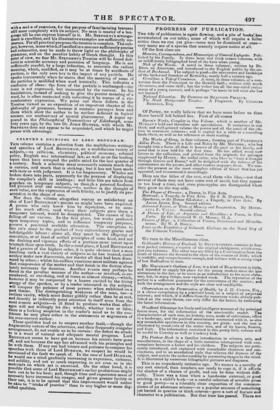STEPHENS ON THE GREEK EXPLETIVE PARTICLES.
THIS little treatise appears calculated to be practically useful to the student of Greek. The author has selected for elucidation the particles which are in that language used to denote the ad- dition of thought to thought, or the contrast of one thought with another—to indicate the contrasting clauses in antithetical sen- tences—or to mark when, in the progress of ratiocination, the writer or speaker proceeds to draw his inference. These words constitute the framework of sentences ; and whatever they may have been originally, have come in the course of time to lose all independent meaning of their own. Hence they are designated expletives. Their right understanding is of the utmost iinpor- tance, as upon their proper collocation and contrast depends much of the idiomatic character, and all the precision and elegance of a language. The Greek tyro will find his progress materially fact- Mated by making himself master of Mr. STEPHENS'S systematic elu- cidation of this important class of words. The author would add materially to the value of his little book, were he to follow it up
with a serial of exercises, for the purpose of familiarising learners still more completely with its subject. No man is master of a lan-
guage till he can express himself in it. Mr. STEPHRNs'S arrange- ment is excellent, and his illustrativeexamples are sufficiently nu- merous. For all practical purposes the treatise is complete. The sub- ject, however, is one which,if handled in a manner sufficiently precise and exhaustive, may be made to throw light on the philosophy of grammar, and on the peculiar habits of Greek thought. In this point of view, we fear Mr. STEPHENiS Treatise will be found defi- cient in scientific accuracy and precision of language. He is not sufficiently careful, by a large induction, to ascertain the radical meaning, which, modified, as it may be at times by accidents of position, is the only sure key to the import of any particle. He speaks inaccurately when he states that the meaning of some of the particles is modified when used ironically. This indicates a confusion of ideas : the force of the particle is unchanged—the irony is not expressed, but insinuated by the context. In his instead nstead of seeking to give the precise meaning of a word, he is often contented with indicating it by means of a cir- cumlocutory expression. We point out these defects in the Treatise viewed as an exposition of an important chapter of the philosophy of grammar, because it contains passages here and there which show the author to be neither deficient in logical acumen nor unobservant of mental plitenomena. A paper ap- peared in the Philosophical Transactions of Edinburgh, some forty years ago, by the late Dr. JOHN HUNTER, with which Mr. STEPHENS does not appear to be acquainted, and which lie might peruse with advantage.



























 Previous page
Previous page